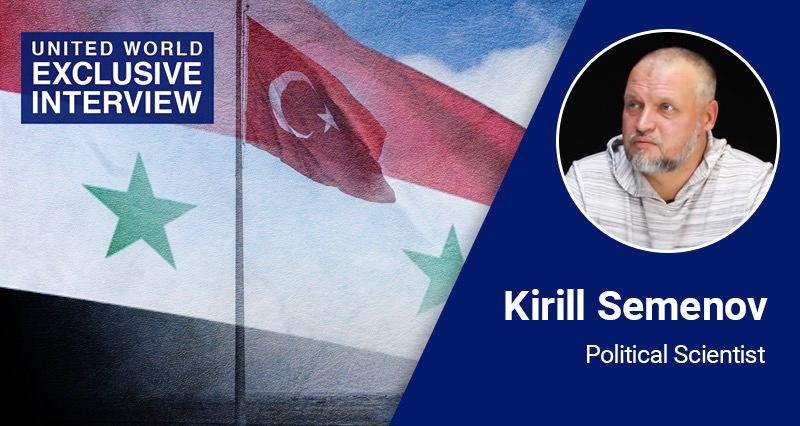By Edvard Chesnokov
On July 25, 2024, the Turkish authorities arrested and deported to Moscow the Russian national Evgeny Serebryakov, an alleged terrorist who had exploded the car of a high-ranked Russian Army officer in Moscow and fled to Bodrum the very previous day, July 24. Assumably Serbebryakov followed the commands of the NATO-backed Ukrainian secret services.
Does it indicate the further rapprochement between Moscow and Ankara amid recent events in East Europe and West Asia? Kirill Semenov, an activist of the Russian Muslim community, an expert of the Russian International Affairs Council, and an Oriental studies specialist, exclusively spoke to UWI on the variety of Near East problems.
What are Russia’s interests/expectations in the normalization of Türkiye and Syria?
For Russia, it is important to end the civil war in Syria and restore the platform of the Damascus-opposition peace talk substantially — either by reanimation of the Constitutional Committee[1] , or by some new format. Obviously, without reconciliation between Erdoğan and Assad, it is impossible. From my viewpoint, Russia does not want to spend its resources to support Assad and future military operations [in Syria] which do not yield Russia itself. Thereby, it’s essential to finally relieve tensions between Ankara and Damascus — to make the ceasefire process irreversible and the return of a huge confrontation impossible. In this regard, the Syria-Türkiye normalization could be shown out as the final milestone of the civil war, and for Russia it is important this milestone to be Russia-made.

What kind of role does Russian President Putin play in Türkiye-Syria normalization?
I assume, the recent July 24, 2024, Assad’s visit to Moscow was connected to the finalization of this process, and Russia’s Vladimir Putin wanted to receive such an assurance from Assad. Moscow fears that Damascus, having orally vowed to complete the normalization, might have continued to make the demands Ankara would not accept in reality.
Is it possible for Türkiye, Syria and Russia to organize a joint operation against terrorist organizations in northern Syria?
Sure, we can not exclude the perspectives of such an operation, but it would be more likely to remind the 2019 Turkish Operation Peace Spring when the advance of pro-Turkish forces would let Assad enlarge his control zone in North East Syria, and then, the process of the conciliation between Assad and pro-Turkish armed opposition would begin, amid partial remaining of the Turkish influence to the latter.
What precautions can be taken regarding [Syrian] immigrants if the war intensifies?
The rise of anti-migrant resentment obviously pushes Erdoğan to find a way to reconciliate with Assad. But in this regard, we mustn’t make a mistake assessing that Ankara would make such a step on any conditions. Assad’s demand to fully withdraw Turkish troops from Syria is unacceptable for Türkiye.
This cancels the entire goal of normalization — meaning the migrant crisis to be solved — because the effect would be quite opposite. The Turkish troops withdrawal would provoke Assad’s offensive to the opposition-controlled regions, which would trigger the new refugee wave to Türkiye. On the contrary, Ankara seeks for those normalization conditions that would make the return of refugees to Syria safe. This means, some hybrid administrative system to govern the opposing Assad-returned regions should be created, in order to reduce the risks of new military operations and mass oppressions.
How do you evaluate Iran’s view on Türkiye-Syria normalization?
Iran supports normalization and will continue to — if this process would not run behind Iran’s eyes and against Iran’s interests in Syria. In some cases, Iran can even push Assad to soften his view, if Iran finds any advantages therein. Iran’s position is pragmatic, while Assad’s is emotional.
(1): https://en.wikipedia.org/wiki/Syrian_Constitutional_Committee

















Leave a Reply